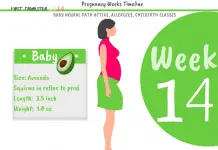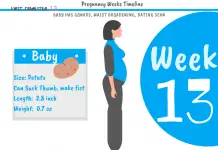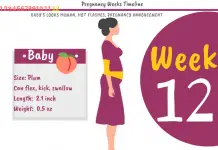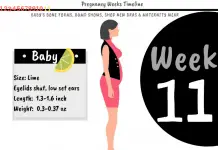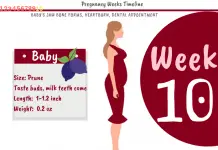You might be reading this after you’ve crossed the pregnancy week 1 and 2. The reason being that medically, pregnancy due date calculator begins from the first day of the last menstrual period (LMP). At 1 week pregnant, your egg has not released, and the sperms are still inside your partner. You’re not pregnant!
For those who are trying to conceive, it is essential to learn about the first week of pregnancy. Until week 3, sex timing and other factors such as stress and sleep will decide, whether you are getting pregnant.
Perhaps you’re reading this after a negative pregnancy test. And your aunt flow is back. Wait, this means that you could still be one week pregnant for the next coming ovulation.
Don’t get confused; it’s simple. The period flow after which you see the symptoms of pregnancy and a positive home pregnancy test, later on, is the first week (1 week pregnant). The period before the missed period, get it?
Those who have already seen the pregnancy test lines, straight away skip to 4 weeks pregnant in our pregnancy week by week series.

How is pregnancy calculated?
The average length of a pregnancy is 280 days. Doctors add the time starting from the last menstrual period or the LMP. It helps them point the conception or ovulation days easily compared to relying on the woman’s account.
Can you detect pregnancy at one week?
There is nothing to detect at week one because you’re chemically not pregnant. You have to wait until four weeks before getting a positive pregnancy test. The two weeks wait will begin after actually getting pregnant. But the two pink or blue lines will appear four weeks from now.
You can not detect pregnancy when you’re one week pregnant. But you can time your pregnancy from week 1. How? By planning to have sex during the next ovulation fertility window.
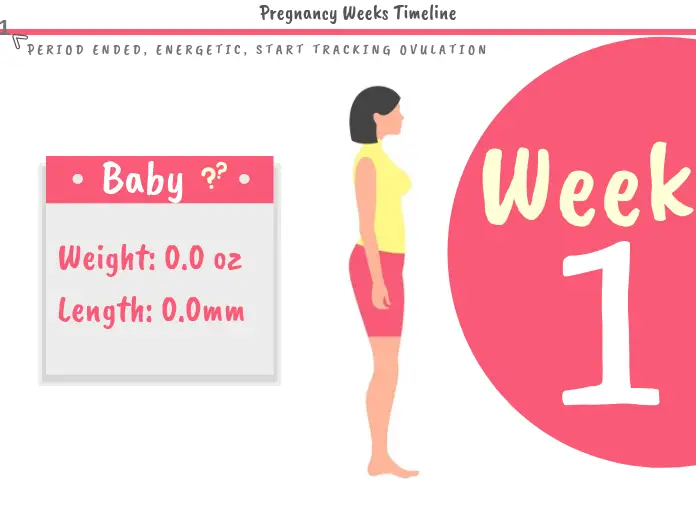
What is going inside your body during pregnancy week 1?
When you are one week pregnant, your period flow begins. The next egg inside your ovary is getting ready to ovulate after two weeks from now.
Actively TTC couples will be timing the fertility window. At five days before ovulation, around 14 days or more from now you’ll conceive.
Symptoms of week 1 pregnancy are nothing else but period signs such as cramps and bleeding.
The reason this week is the first week of gestation is that it is easier to time the pregnancy. Using the last periods, you have physically reliable signs to use for conception calculator. Ovulation and conception have practically no external changes that you can see. You have 39 weeks more to go after this stage.
When you learn the method of conception calculator, you can only recollect the date you were one week pregnant. By now, after taking the test, you’re likely to be 4-5 weeks pregnant.
Women who have confirmed their pregnancy would practically not need any further information. You must jump straight to week four, minimum. It is possible that you’re way ahead of week four already. Yeah!
Week 1 Pregnancy Symptoms
What changes occur when you’re one week of pregnancy?
Most of you are trying to find out signs of pregnancy after missed periods. But that is the case of pregnancy week four. Week 1 pregnancy symptoms are nothing but period days. Vaginal bleeding, cramps, mood changes, appetite fluctuations, and PMS.
Signs of pregnancy in week one are:
1) PMS
Pre Menstrual Syndrome continues until you start bleeding. So you may experience acne breakout, anxiety, sweating, cramping, borborygmus, and vaginal pain. Mood swings take over you, and emotional breakouts occur. Suddenly crying or being fussy about everything is a common PMS symptom. Aggravated PMS can have the same symptoms at a very higher level. On the other hand, some women don’t have PMS signs before period. They might not have cramps and pain either.
2) Period flow
The previous lining has to slough off the uterus. Ovum from last ovulation now comes out of your body. But you couldn’t pregnant with that ovum as an egg is viable for only 24 hours. Once a day crosses from ovulation, you cannot conceive from that egg.
Bright red or dark red blood comes off your vagina at a rapid pace. Panty liner gets wet and needs a change frequently. As days pass the bleeding will be erratic, and spotting starts. Most women have a period flow for 3-5 days.
3) Cramps and backache
Period cramping is because the uterus becomes sensitive. The falling level of hormones cause changes in the body. Blood loss causes lethargy and irritability. Backache is due to ovarian or uterine pain.
Each woman gives a different description of cramping. While some say, it feels like stabbing others feel like a wringing pain.
When you are three weeks pregnant, the period cramps will be absent. Thereby the next period will not come and spotting because of implantation might occur.
4) Leg pain
Slightly more than rarely, women have a strange pain in their feet during menstruation. You might confuse it with pregnancy leg cramps. But leg cramps during pregnancy occur in later stages. Pain in feet during the period is because of hormonal changes or sleeping posture.
5) Mood Swings
Period and mood fluctuations are you first puberty green flags. A 1-week pregnant woman will also be moody. Will they get worse or calmer with conception is not the same for everyone. You will have a hard time dealing with nausea and vomiting. The new irritating stuff will probably trigger your moodiness worse. Emotional breakdown happens for some women before every period.
6) Appetite changes
Before the menstruation, you either feel like eating everything on the table spread or nothing at all. Mostly the falling hormones disappear your appetite. Soon after the flow begins, your appetite comes back. Don’t worry if the opposite happens in your case.
7) Feverish
Some women have a higher body temperature while on period. It can either be the hormones or falling sick. Sneezing and other symptoms are common when you are on your period. All of the things happening in combination make you feel sick.
8) Bloating
The uterus becomes tender, and the blood vessels and the wall comes off. As the lining breaks, the uterus is uneasy. Surrounding organs make space for the uterus in pain. Bloating is not rare during menstruation bleeding days.
9) Headache
Just like migraine during pregnancy, some patients have a headache during a period. Make sure the prescription you use for pain is not harmful to the baby. Though you don’t have the baby, yet some drugs affect fertility and chance of conceiving.
10) Paleness
When there is a loss of blood, the skin looks pale. The energy draining makes you look sick and takes away your glow. Paleness is often misinterpreted as becoming fairer during a period. But it’s hormones and loss of blood and not the pregnancy glow.
Breasts during one week pregnant are not significantly different. Don’t search for Week 1 Pregnant symptoms pictures all over the internet. There are no pregnancy symptoms week 1 in reality. You’ll see exact pregnancy symptoms by 4 weeks pregnant.
1 Week Pregnant Belly
How does 1-week pregnant belly look?
Your 1 week pregnant belly is bloated and is cramping. The previous egg, along with the cushion walls, is shedding off. Soon a new lining will form inside the uterus. About 14-19 days from now depending on the length of your menstrual cycle, your ovary will release the egg. That egg will become your baby.
First-week pregnant stomach is your bloated belly because of periods. The stomach size doesn’t change much from ordinary. But it is extremely sensitive at that time, and even a light push hurts.
At this point, your belly holds nothing of the pregnancy that has by definition begun. There is the egg from the previous month and the lining for the same. Had that egg been the baby to be you’d be four weeks pregnant right now!
The stomach at this point of time looks like your belly every month during the menstruation. There will be absolutely no change in your belly at pregnancy week 1. And the same will exist until you are 8 weeks pregnant.
Cramps cause constipation like symptoms, and the swelling of the uterus causes bloating. But none of them are because of pregnancy.
The egg that you will ovulate soon will be so small that you’d feel nothing. Practically there is nothing new happening until week 4. The changes that occur during 1-weeks pregnant are just the things you experience every month.
Unless you’re planning to get pregnant, it’s unlikely that you’d be reading this at one-week pregnancy. So make sure that you understand the process correctly by timing things right.
1 Week Pregnancy Test
There is no need for a pregnancy test while one week pregnant. Home PT kits use hCG hormone to test pregnancy. The hCG levels in 1-week pregnant woman will be below 5 mIU/mL. No HPT detects the level. Also, until you have at least 25 mIU/mL hCG level, you are in the grey zone of pregnancy tests.
All the pregnancy test kits claiming detecting pregnancy early talk about four weeks or later.
After baby making sex, there is a two-week wait that you must take up before pregnancy test.
How soon can I take a pregnancy test? Soonest to take a test for pregnancy is the time before the missed period. But the chances of getting a false negative are high even then.
1 Week Pregnant Ultrasound
What can you expect to see in week one ultrasound?
Ultrasound and prenatal checkups begin after you are six weeks pregnant. Unless you are extra cautious and trying to conceive there is hardly anything like 1-weeks pregnant ultrasound.
Women dealing with infertility or before getting an IVF treatment will get the first-week ultrasound. The scan will check the thickness of their uterine lining. A certain thickness of the endometrium is an indicator of the possibility of pregnancy. If your endometrial lining is too thin such as in case of atrophic vaginitis, you can’t get pregnant.
What can you see in 1 week ultrasound?
Your ovaries and the developing eggs will be visible in the ultrasound. The doctor will be able to make out which stage of the menstruation cycle on seeing the size of ovaries. Any fibroids or blockages such as septate uterus will also show in the 1-week ultrasound.
What must you do during pregnancy week 1?
Calculate your ovulation due date and time ‘love-making’ sessions for getting pregnant.
Tune your sleep, diet, and peace. Cut down caffeine, smoking, contraceptives, and alcohol.
Get busy doing what? Baby – making preps! Don’t indulge in intercourse from now on. Having intercourse every day will affect your partner’s sperm count per ejaculate, and fatigue is inevitable.
First weeks of pregnancy are pro-inflammatory, and you’re going to deal with nausea and congestion. Ask your doctor about medications that will not interfere with your pregnancy.
Read a lot about pregnancy and related topics to be better prepared. Once TTC, you must read and learn and be equipped to face anything.
Pregnancy symptoms will occur after a few weeks. So, don’t let anxiety take over you during the weeks before. Keep calm and stay healthy.
Start taking prenatal vitamins with 400 mcg Folic Acid. Folic acid is an essential vitamin for your baby’s brain and your body too.
Stop using contraceptive now. Track your period length and determine whether it is a short or prolonged menstrual cycle.
Check your weight and get pre-pregnancy counseling. The doctor will do a pedigree analysis studying your family’s pattern of inheritance. That can save you from having a baby with genetic diseases.
Get immunized and consult your doctor about any chronic diseases you have. If you’re taking any medications such as antidepressants or psychotic drugs, do mention them.
How to track ovulation?
The egg is viable only for 24 hours after its release from the ovary. Fertility window is five days long because sperms can live inside you for three days. TTC couples must have sex in this 5-day long period. Some women have ovulation cramps and spotting.
Ovulation is a very sensitive process. Stress, change in daily routine, illness, and other alterations can affect ovulation.
You ovulate on the 14th day of the cycle if it is a short cycle, 28 days. Longer cycles of 32 days have a longer luteal phase, but ovulation is mostly near the 14th day.
For timing ovulation, you can chart BBT or use an ovulation test. Adding 14 days to the last day of the period will give an approximate value. A better method is to subtract 15 days from the next due period.
Our Online ovulation calculator is available to detect ovulation using your period information. It is accurate, free and easy to use.
Don’t forget to read our other pregnancy week by week articles.



![First Trimester Of Pregnancy: Weeks 1 To 13 First Trimester [Week 1- Week 13 Overview]](https://www.pregnanteve.com/wp-content/uploads/2019/07/first-trimester-of-pregnancy-218x150.jpg)
